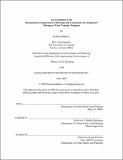An evaluation of the Massachusetts Department of Housing and Community Development's Moving to Work voucher program
Author(s)
Mahdavi, Pedram
DownloadFull printable version (2.149Mb)
Other Contributors
Massachusetts. Dept. of Housing & Community Development.
Advisor
J. Phillip Thompson.
Terms of use
Metadata
Show full item recordAbstract
Since implementation nearly 10 years ago there has been limited research into the outcomes of the Massachusetts Department of Housing and Community Development's Moving to Work rental subsidy program. The Congressionally authorized Moving to Work Demonstration program (MtW) deregulated housing agencies in order to provide flexibility to design and test innovative approaches to administering housing assistance programs. In 1999, DHCD began planning and implementation for two MtW pilots, one in Boston, targeting the shelter population, and another in Southern Worcester County, targeting working or "work-ready" households. The current program design provides 183 clients with fixed shallow rental subsidy amounts, support budgets, time limits, and case management to encourage and facilitate self-sufficiency. Preparing to transition its full HCVP portfolio to MtW status, DHCD initiated a process of evaluation and learning focused on the pilots. These lessons, which involve data collection processes and program implementation as well as outcomes, will inform the future of the statewide MtW program. This research is a qualitative and quantitative assessment of both pilot programs. The research used available baseline and current client employment, income and locational data to determine how effective DHCD's MtW model was at facilitating self-sufficiency. Additionally, focus groups with MtW clients and interviews with administrators were conducted to understand the impact and effectiveness of the program from multiple perspectives. (cont.) Using various poverty and self-sufficiency, measures, the research finds that, in general, the program has successfully kept clients out of "deep poverty" but has not moved them out of poverty. Hence, the program has fallen short on facilitating economic self-sufficiency. The paper concludes with a set of recommendations for DHCD's future implementation and expansion efforts.
Description
Thesis (M.C.P.)--Massachusetts Institute of Technology, Dept. of Urban Studies and Planning, 2009. This electronic version was submitted by the student author. The certified thesis is available in the Institute Archives and Special Collections. Includes bibliographical references (p. 85-87).
Date issued
2009Department
Massachusetts Institute of Technology. Department of Urban Studies and PlanningPublisher
Massachusetts Institute of Technology
Keywords
Urban Studies and Planning., Massachusetts. Housing & Community Development.